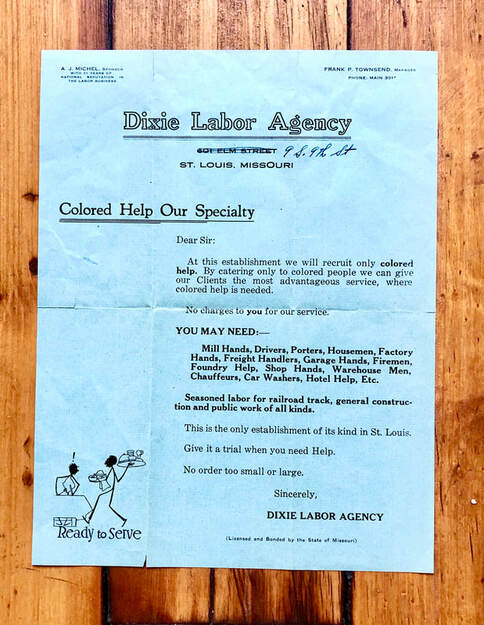PR190
Dixie Labor Agency Hiring Flyer
St. Louis, MO 1926
The Dixie labor agency was a notorious employment agency that operated in St. Louis, Missouri during the 1920s. The agency was known for exploiting African American workers by placing them in low-paying, dangerous jobs with no job security or benefits.
The agency was founded by a man named W.R. Dixie, who had previously operated a similar agency in Birmingham, Alabama. Dixie saw an opportunity to make money by exploiting the large African American population in St. Louis, who were eager for work but often faced discrimination and limited job opportunities.
The agency would recruit workers from the South, promising them good jobs and a better life in the North. However, when the workers arrived in St. Louis, they were often placed in menial, low-paying jobs such as janitorial work, factory work, or domestic service. The agency charged the workers high fees for their services, which often left the workers in debt and unable to leave the job.
The agency also had a reputation for mistreating its workers, with reports of workers being beaten, threatened, and forced to work long hours with no breaks. In addition, the agency would often blacklist workers who complained or tried to leave, making it difficult for them to find employment elsewhere.
The Dixie labor agency was eventually shut down in the 1930s, after investigations by the federal government and labor unions exposed its exploitation of workers. However, its legacy of exploiting African American workers and perpetuating racial inequality in the workplace continued for many years.
The agency was founded by a man named W.R. Dixie, who had previously operated a similar agency in Birmingham, Alabama. Dixie saw an opportunity to make money by exploiting the large African American population in St. Louis, who were eager for work but often faced discrimination and limited job opportunities.
The agency would recruit workers from the South, promising them good jobs and a better life in the North. However, when the workers arrived in St. Louis, they were often placed in menial, low-paying jobs such as janitorial work, factory work, or domestic service. The agency charged the workers high fees for their services, which often left the workers in debt and unable to leave the job.
The agency also had a reputation for mistreating its workers, with reports of workers being beaten, threatened, and forced to work long hours with no breaks. In addition, the agency would often blacklist workers who complained or tried to leave, making it difficult for them to find employment elsewhere.
The Dixie labor agency was eventually shut down in the 1930s, after investigations by the federal government and labor unions exposed its exploitation of workers. However, its legacy of exploiting African American workers and perpetuating racial inequality in the workplace continued for many years.



